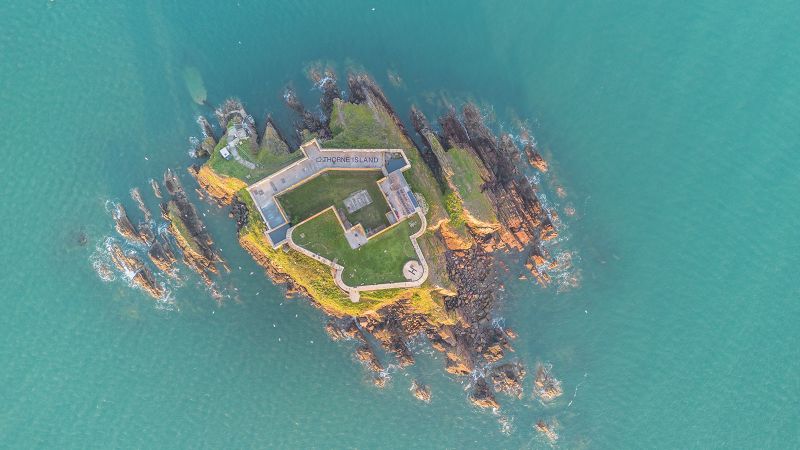Thorne Island, located just three nautical miles off the charming Pembrokeshire coast in west Wales, offers a unique escape characterized by its secluded nature and rich history. This private island, not just picturesque but steeped in historical significance, is home to an impressive 19th-century fort. Extending approximately 2.49 acres, Thorne Island has recently attracted attention as it has been put up for sale. The current owner is seeking offers exceeding £3 million (approximately $4 million), as detailed in a listing on the Strutt & Parker website.
The fort on Thorne Island boasts a variety of amenities that elevate its appeal. This includes a helipad for easy access, a covered rooftop bar perfect for socializing, a games room for entertainment, and even a sea-view office that combines work with breathtaking scenery. Originally constructed to accommodate 100 men, the fort has been meticulously restored and is now capable of hosting up to 20 guests comfortably in its five luxurious bedrooms. Additional living spaces include grand dining rooms, wide terraces, and sheltered areas that reflect the fort’s rich military heritage.
Constructed between the years of 1852 and 1854, the fort on Thorne Island was part of a broader initiative aimed at bolstering national defenses against potential Napoleonic invasions. However, the military significance of the Welsh island gradually diminished, and the fort transitioned into a hotel and family home since its sale in 1932. This historical shift speaks volumes about the adaptability of the property and its evolving role in serving the community and visitors alike.
Mike Conner, a British technology entrepreneur, is currently the proud owner of the island, having purchased it in 2017 for £500,000 (around $670,000) after stumbling upon a captivating YouTube video showcasing the potential of the fort. At the time of purchase, the property was in dire need of restoration, lacking windows and essential utilities, while being plagued by waterlogging. Conner, driven by fascination and ambition, saw this as a once-in-a-lifetime opportunity to undertake a monumental renovation project.
The journey of restoring the fort was not without its challenges. Conner candidly acknowledged that he initially underestimated many aspects of the renovation, including the complexities involved in installing modern plumbing. Essential tasks, such as digging trenches through rugged terrain and establishing a reliable water supply, added to the project’s scope. A staggering 350 helicopter trips over two days were necessary to transport various construction materials, including topsoil and essential equipment like heat pumps for central heating.
Renovating the fort took considerable time, especially given the dilapidated condition of the structure when Conner acquired it. For instance, sandblasting the original stone walls took six months, revealing the fort’s historical charm underneath layers of neglect. Areas of the granite walls were so saturated with moisture that they led to flooding, complicating the restoration efforts further.
With an investment that exceeded £2 million (roughly $2.7 million), Conner, the founder of Appsbroker (later known as Qodea), has transformed the fort into a self-sufficient haven. Part of this substantial cost included investing in renewable energy systems, such as solar panels and a biodigester system for wastewater management. At 52 years old, Conner emphasized that this endeavor served as both a personal challenge and a refreshing mid-life project.
Having ensured that the fort is equipped to withstand harsh salt air and storm-force winds, Conner has enjoyed time in the newly renovated accommodations with his family. He believes the property holds immense potential as a luxurious retreat or event venue for those seeking solace or a unique experience. Yet, he is already contemplating his next challenge, expressing a desire to find another intriguing project in the future.











